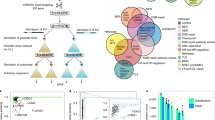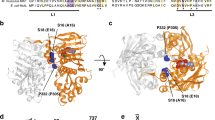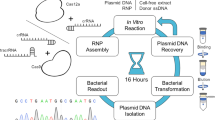Abstract
The use of gene therapy to correct mutated or lost gene function for the treatment of human cancers has been an active, yet problematic area of biomedical research. Many technical difficulties, including efficient tissue-specific delivery, integration site specificity and general toxicity, are being addressed. Little is known, however, about the genetic and phenotypic stability that accompanies a successful gene-specific targeting event in a cancer cell. This question was addressed following the creation of a colon cancer cell line in which a mutated hMLH1 gene was corrected via targeted homologous recombination. This correction resulted in the expression of wild-type hMLH1 protein, restoration of the hPMS2 protein and mismatch repair (MMR) proficiency. One of two hMLH1-corrected clones, however, was found to retain defects in MMR activity. These cells continued to express the corrected hMLH1 protein, but had lost expression of another MMR protein, hMSH6. DNA sequence analysis of the hMSH6 gene revealed biallelic expansions of a cytosine repeat region in exon 5 that result in frameshifts leading to premature stop codons. These findings suggest that, similar to acquired drug resistance, the presence of genetically heterogeneous cancer cell populations or acquisition of compensatory mutations can result in ‘resistance’ to gene replacement therapy.
This is a preview of subscription content, access via your institution
Access options
Subscribe to this journal
Receive 12 print issues and online access
$259.00 per year
only $21.58 per issue
Buy this article
- Purchase on Springer Link
- Instant access to full article PDF
Prices may be subject to local taxes which are calculated during checkout




Similar content being viewed by others
References
Hoeijmakers JH . Genome maintenance mechanisms for preventing cancer. Nature 2001; 411: 366–374.
Liu B, Parsons R, Papadopoulos N, Nicolaides NC, Lynch HT, Watson P et al. Analysis of mismatch repair genes in hereditary non-polyposis colorectal cancer patients. Nat Med 1996; 2: 169–174.
Lawes DA, SenGupta S, Boulos PB . The clinical importance and prognostic implications of microsatellite instability in sporadic cancer. Eur J Surg Oncol 2003; 29: 201–212.
Okuda T, Kawakami K, Ishiguro K, Oda M, Omura K, Watanabe G . The profile of hMLH1 methylation and microsatellite instability in colorectal and non-small cell lung cancer. Int J Mol Med 2005; 15: 85–90.
Boland CR, Thibodeau SN, Hamilton SR, Sidransky D, Eshleman JR, Burt RW et al. A National Cancer Institute Workshop on Microsatellite Instability for cancer detection and familial predisposition: development of international criteria for the determination of microsatellite instability in colorectal cancer. Cancer Res 1998; 58: 5248–5257.
Drummond JT, Genschel J, Wolf E, Modrich P . DHFR/MSH3 amplification in methotrexate-resistant cells alters the hMutSalpha/hMutSbeta ratio and reduces the efficiency of base-base mismatch repair. Proc Natl Acad Sci USA 1997; 94: 10144–10149.
Marra G, Iaccarino I, Lettieri T, Roscilli G, Delmastro P, Jiricny J . Mismatch repair deficiency associated with overexpression of the MSH3 gene. Proc Natl Acad Sci USA 1998; 95: 8568–8573.
Aebi S, Kurdi-Haidar B, Gordon R, Cenni B, Zheng H, Fink D et al. Loss of DNA mismatch repair in acquired resistance to cisplatin. Cancer Res 1996; 56: 3087–3090.
Anthoney DA, McIlwrath AJ, Gallagher WM, Edlin AR, Brown R . Microsatellite instability, apoptosis, and loss of p53 function in drug-resistant tumor cells. Cancer Res 1996; 56: 1374–1381.
Humbert O, Fiumicino S, Aquilina G, Branch P, Oda S, Zijno A et al. Mismatch repair and differential sensitivity of mouse and human cells to methylating agents. Carcinogenesis 1999; 20: 205–214.
Kavanagh J, Tresukosol D, Edwards C, Freedman R, Gonzalez de Leon C, Fishman A et al. Carboplatin reinduction after taxane in patients with platinum-refractory epithelial ovarian cancer. J Clin Oncol 1995; 13: 1584–1588.
Gottesman MM . Cancer gene therapy: an awkward adolescence. Cancer Gene Ther 2003; 10: 501–508.
Urnov FD, Miller JC, Lee YL, Beausejour CM, Rock JM, Augustus S et al. Highly efficient endogenous human gene correction using designed zinc-finger nucleases. Nature 2005; 435: 646–651.
Liu PQ, Rebar EJ, Zhang L, Liu Q, Jamieson AC, Liang Y et al. Regulation of an endogenous locus using a panel of designed zinc finger proteins targeted to accessible chromatin regions. Activation of vascular endothelial growth factor A. J Biol Chem 2001; 276: 11323–11334.
Jallepalli PV, Waizenegger IC, Bunz F, Langer S, Speicher MR, Peters JM et al. Securin is required for chromosomal stability in human cells. Cell 2001; 105: 445–457.
Baerenfaller K, Fisher F, Jiricny J . Characterization of the ‘mismatch repairosome’ and its role in the processing of modified nucleosides in vitro. Methods Enzymol 2006; 408: 285–303.
Papadopoulos N, Nicolaides NC, Wei YF, Ruben SM, Carter KC, Rosen CA et al. Mutation of a mutL homolog in hereditary colon cancer. Science 1994; 263: 1625–1629.
Brieger A, Trojan J, Raedle J, Plotz G, Zeuzem S . Transient mismatch repair gene transfection for functional analysis of genetic hMLH1 and hMSH2 variants. Gut 2002; 51: 677–684.
Yamada NA, Castro A, Farber RA . Variation in the extent of microsatellite instability in human cell lines with defects in different mismatch repair genes. Mutagenesis 2003; 18: 277–282.
Bonk T, Humeny A, Gebert J, Sutter C, von Knebel Doeberitz M, Becker CM . Matrix-assisted laser desorption/ionization time-of-flight mass spectrometry-based detection of microsatellite instabilities in coding DNA sequences: a novel approach to identify DNA-mismatch repair-deficient cancer cells. Clin Chem 2003; 49: 552–561.
Plaschke J, Kruger S, Jeske B, Theissig F, Kreuz FR, Pistorius S et al. Loss of MSH3 protein expression is frequent in MLH1-deficient colorectal cancer and is associated with disease progression. Cancer Res 2004; 64: 864–870.
Umar A, Boyer JC, Thomas DC, Nguyen DC, Risinger JI, Boyd J et al. Defective mismatch repair in extracts of colorectal and endometrial cancer cell lines exhibiting microsatellite instability. J Biol Chem 1994; 269: 14367–14370.
Genschel J, Littman SJ, Drummond JT, Modrich P . Isolation of MutSbeta from human cells and comparison of the mismatch repair specificities of MutSbeta and MutSalpha. J Biol Chem 1998; 273: 19895–19901.
Christmann M, Kaina B . Nuclear translocation of mismatch repair proteins MSH2 and MSH6 as a response of cells to alkylating agents. J Biol Chem 2000; 275: 36256–36262.
Szadkowski M, Jiricny J . Identification and functional characterization of the promoter region of the human MSH6 gene. Genes Chromosomes Cancer 2002; 33: 36–46.
Malkhosyan S, Rampino N, Yamamoto H, Perucho M . Frameshift mutator mutations. Nature 1996; 382: 499–500.
Peltomaki P . Deficient DNA mismatch repair: a common etiologic factor for colon cancer. Hum Mol Genet 2001; 10: 735–740.
Zhang H, Richards B, Wilson T, Lloyd M, Cranston A, Thorburn A et al. Apoptosis induced by overexpression of hMSH2 or hMLH1. Cancer Res 1999; 59: 3021–3027.
Acknowledgements
We thank Drs Bert Vogelstein and Joseph Jiricny for helpful advice and the critical reading of the manuscript and Drs James Carney and Teresa Wilson for helpful discussions. This work was funded by the Maryland Cigarette Restitution Fund, The Flight Attendant's Medical Research Institute (FAMRI), NIH 1R01CA109274-01A2, The Department of Defense Breast Cancer Research Program (DAMD17-03-1-0241) and the Avon Foundation. BHP is an Avon Scholar for Breast Cancer Research and also receives support from The V Foundation for Cancer Research.
Author information
Authors and Affiliations
Corresponding author
Rights and permissions
About this article
Cite this article
Weiss, M., Vitolo, M., Baerenfaller, K. et al. Persistent mismatch repair deficiency following targeted correction of hMLH1. Cancer Gene Ther 14, 98–104 (2007). https://doi.org/10.1038/sj.cgt.7700997
Received:
Revised:
Accepted:
Published:
Issue Date:
DOI: https://doi.org/10.1038/sj.cgt.7700997



